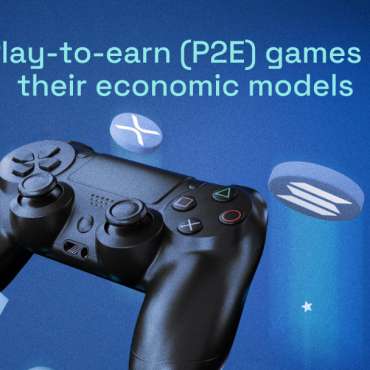Gone are the days when playing was all about high scores and bragging. Earning while playing is no longer a pipe dream for gamers all over the world; thanks to play-to-earn games, it is quickly becoming a reality.
Traditionally, users would spend hours playing games, earning things and awards that had little worth outside of the game. However, thanks to Web3 and blockchain technology, your character, goods, and, most importantly, your hard-earned treasure may now have value outside of the game!
This article peels back the layers of “Earning Beyond Play: Exploring DeFi Opportunities in Web3 Games,” which allows dedicated gamers to make money from their time in the virtual world.
DeFi World and Web3 Games
DeFi World’s Web3 games are a ground-breaking addition to the gaming industry, combining decentralized finance (DeFi) with immersive gameplay. In these games, users enter a virtual world where they may not only play but also earn real money using cryptocurrencies and non-fungible tokens (NFTs).
Consider entering a world where your gaming abilities translate into actual benefits. This is exactly what happens in DeFi World’s p2e games. Completing missions, winning fights, and conquering challenges will earn you native tokens, which may then be exchanged or staked for even larger rewards.
Furthermore, DeFi World’s integration allows access to a larger ecosystem. You may join liquidity pools, stake your earnings, and look into cross-platform synergies to improve your gaming experience. DeFi is accelerating the free play-to-earn game revolution by introducing the notion of actual ownership and decentralized economies. Using blockchain technology and smart contracts, developers may create verifiable and uncommon in-game items that players can genuinely possess.
As the Web3 gaming platform evolves, DeFi World leads the way, providing users with fascinating chances to play, earn, and explore in this exciting new gaming arena.
DeFi’s Impact on Gaming Economies
Decentralized finance (DeFi) is an important aspect of game economies. It creates environments in which gamers can conduct peer-to-peer trading in decentralized in-game marketplaces free of central authority.
This covers trading, lending, yield farming, and staking using smart contracts.
By participating in DeFi, users contribute significantly to the in-game commerce ecosystem. This enables individuals to reap rewards from participating in the game’s economy.
DeFi transforms traditional gaming money into cryptocurrencies with real-world value. These digital assets become marketable entities with investment potential and ownership rights.
Making blockchain technology more efficient at managing high volumes of activity and less expensive to utilize is critical for these lively economic systems to function and thrive.
Exploring DeFi opportunities in Web3 Games
Lending and Borrowing
Lending and borrowing are core components of conventional finance, and they have been effectively applied in the DeFi world. Users may earn money by lending their digital assets to borrowers on the site.
This is how it works
- On the Gamefi platform, users enter into a smart contract that secures their digital assets.
- Borrowers can then use these assets as loans and repay interest to the platform.
- The platform pays out the income collected to lenders in proportion to the amount they have locked in.
DeFi lending reduces the chance of default. Borrowers must secure collateral before borrowing assets, and smart contracts require interest repayments from the collateral if borrowers fail to pay.
Benefits
Passive Income Generation: Earn interest on your cryptocurrency assets without actively maintaining them.
Competitive Rates: Potentially earn better interest rates than standard savings accounts.
Decentralized Finance: Contribute to a more democratic and transparent financial system.
Staking
Gamefi staking platform in DeFi is the process of locking digital assets inside a smart contract, allowing users to earn money over time. The process is comparable to creating a savings account in traditional finance. Similar to investment vehicles, the user’s balance will earn additional revenue in the form of tokens.
How it Works
Proof of Stake (PoS), the stakeholder must have a minimum number of tokens and run a network validation node. This method is also known as “solo staking”.
In contrast, incentivized staking occurs through staking pools, in which people interested in making money in DeFi can pool their assets and get incentives according to their commitment.
Benefits
Passive Income Generation: Earn incentives without actively exchanging your cryptocurrency.
Network Security: Help to maintain the stability and decentralization of the DeFi ecosystem.
Minimal Management: Gamefi staking infrastructure frequently involves little technical knowledge or regular supervision.
Liquidity Provision
Liquidity provision is a means of generating DeFi passive income by providing liquidity to decentralized exchanges (DEXs). These DEXs employ automated market maker (AMM) protocols to create crypto liquidity pools of equal-value token pairings.
How does a liquidity pool work?
Let us look at an example. In an AXE/USDC liquidity pool, members can contribute $1000 in liquidity by putting $500 in AXE and $500 in USDC. In exchange, users receive LP tokens reflecting their portion of the overall liquidity pool cryptocurrency. These tokens can be redeemed for their investment plus any swap-related revenue.
LPs gain a share of the swap charge or commission based on their part of the liquidity pool—the more swaps in the pool, the more revenue they make.
Benefits
Passive revenue Generation: Earn a consistent source of revenue from trading fees.
Market Efficiency: Help create a more liquid and efficient DeFi marketplace.
Decentralized Exchange: Encourage the development of a peer-to-peer financial system.
Yield Farming
Yield farming is a common way to generate passive income with DeFi in Web3 gaming. It entails locking LP tokens into specialized “farms” where they can earn additional benefits in addition to those earned by supplying liquidity to liquidity pools in cryptocurrency. Yield farming combines staking and liquidity provisions to optimize returns.
To begin yield farming, users must first become LPs by adding liquidity to a pool. They then invest their LP tokens in various yield-generating activities, such as lending and borrowing protocols or leveraged trading methods. These activities provide extra benefits, such as new tokens or interest payments. Users may then increase their profits by reinvesting them in the farm or withdrawing them.
Benefits
Potentially High profits: Yield farming can produce much better earnings than staking or liquidity provision.
Flexibility: Switch your crypto assets between protocols to optimize your returns.
Advanced Strategies: Yield farming provides experienced users with a dynamic method for DeFi revenue production.
Decentralized Autonomous Organizations (DAOs)
Decentralized Autonomous Organizations (DAOs) are internet-based communities that share common aims and governance systems. Some DAOs provide governance tokens to their members.
These tokens entitle investors to a part of the DAO’s revenues, which might generate passive income. For example, a DAO that manages a DeFi lending protocol may transfer a percentage of its produced interest to governance token holders.
Benefits
Profit Sharing: Earn passive money from the success of the DAO you’ve invested in.
Community Governance: Use voting to help shape the DAO’s future path.
Early Access to Innovation: DAOs are at the vanguard of DeFi innovation, providing access to cutting-edge initiatives.
Benefits of DeFi Opportunities in Web3 Games
In this way, DeFi games players to own, trade, and sell in-game assets across multiple platforms, while enjoying the benefits listed below:
Ownership
Assets earned or purchased in Web3 games are represented by Non-Fungible Tokens (NFTs) and other digital tokens, which are unique digital assets kept on the blockchain. These NFTs or tokens may frequently be exchanged, sold, or utilized in many games, allowing players complete control over their virtual assets.
Decentralized Marketplaces
These platforms allow players to exchange NFTs directly with one another, eliminating the need for a middleman. This technique assures fair pricing and minimizes the possibility of fraud.
Interoperability
Favorite in-game items or abilities can occasionally be transferred to a new adventure, increasing the value of digital assets and allowing for previously unattainable flexibility.
Transparency
Blockchain keeps a public record of all transactions, allowing anybody to authenticate them and claim ownership. This openness improves the system’s security and trustworthiness.
Community-Driven Development
Decentralized Autonomous Organizations (DAOs), communities that make choices based on member votes, allow players direct control over the games’ future, including stories, weaponry, and rewards.
Closing Thoughts
DeFi has created intriguing opportunities for individuals to produce passive income from crypto assets. Users may make returns on their investments by utilizing tactics like liquidity provision, staking, yield farming, DAO, and lending while engaging in the active Web3 game environment.
However, DeFi must be approached with caution, rigorous investigation, and excellent risk management. These are all included in the Xield protocol to make your DeFi chances a reality in P2E games.




